Centre pour le bien-être, l’inclusion, la soutenabilité et l’égalité des chances (WISE)
Trustlab
 Trustlab is an innovative OECD initiative that aims to improve existing measures of trust as well as understand what drives trust and how policymakers might go about restoring it. The OECD is partnering with researchers from a set of world-class institutions to improve measures of trust and disentangle the drivers of a concept that is still poorly understood. Trustlab combines cutting-edge techniques drawn from behavioural science and experimental economics with an extensive survey on the policy and contextual determinants of trust in other people and trust in institutions.
Trustlab is an innovative OECD initiative that aims to improve existing measures of trust as well as understand what drives trust and how policymakers might go about restoring it. The OECD is partnering with researchers from a set of world-class institutions to improve measures of trust and disentangle the drivers of a concept that is still poorly understood. Trustlab combines cutting-edge techniques drawn from behavioural science and experimental economics with an extensive survey on the policy and contextual determinants of trust in other people and trust in institutions.
Trust and its determinants, an OECD Statistics Working Paper, describes the results of the Trustlab data collection implemented in the following six OECD countries between November 2016 and November 2017: France, Germany, Italy, Korea, Slovenia and the United States.
Ethnic bias, economic success and trust, a new Trustlab study, looks at trust between ethnic groups in the United States and Germany. The ethnic in-group bias, defined as the propensity to favour members of one’s own ethnic group in terms of monetary payoff in online trust games, is significant in both countries. We also examine whether releasing information on the trustee being rich reduces ethnic differentiation, and show that discrimination by the ethnic majority is indeed reduced.
Scroll down to find out more.
THE TRUSTLAB APPROACH |
Trustlab is a unique project that has assembled experimental data on trust in other people, trust in institutions, and social norms for 1,000 people in each country. While behavourial games have been used in a number of larger and smaller experiments, never have they been implemented on a nationally representative sample across multiple countries.
Advances in behavioural science use laboratory experiments that simulate real-life situations to measure trust and other social norms. The most relevant of these, the trust game, involves two participants who can maximise their earnings if they engage in an interaction that requires displaying both trust and trustworthiness.
Scroll down to New Measures on Trust for more detail.
The trust game measures people’s trust through a behavioural game

SO WHO DO WE TRUST? WHAT DID WE LEARN FROM TRUSTLAB EXPERIMENT? |
Trustlab reveals a substantial lack of trust in institutions across the countries surveyed, with governments and parliaments faring particularly poorly, while judicial systems are relatively more trusted. But there are differences in the ranking of perceived trustworthiness of various institutions. For example, Germans are particularly distrustful of financial institutions, while British people display the least trust in the media.
The government and the parliament are the least trusted institutions in most countries surveyed
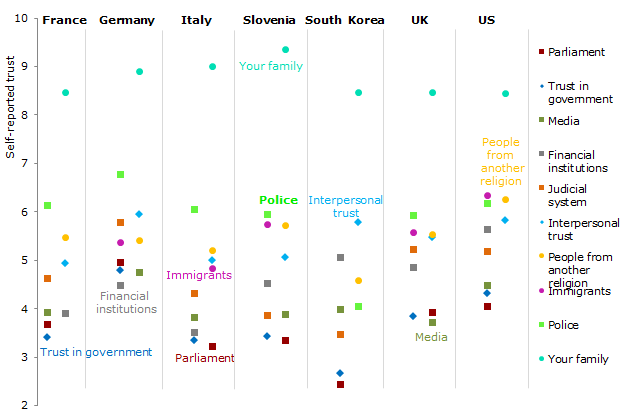 |
|
This figure reports self-reported levels of trust, based on average responses on survey questions that ask people if they trust certain groups or institutions on a scale from zero to ten. Squares denote institutions, while circles represent groups of people. |
People trust each other most in Germany, followed by South Korea. There is a notable difference between these countries and France, Italy and Slovenia, where trust is around one point lower on the scale from zero to ten.
High levels of education and income are associated with higher levels of trust in other people…
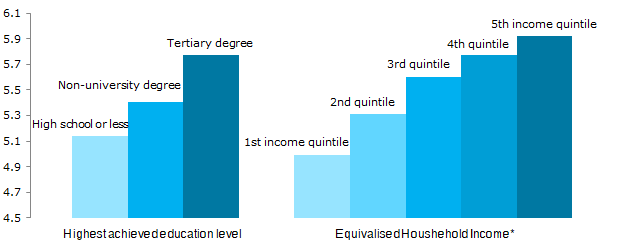 |
…and also with higher trust in the government
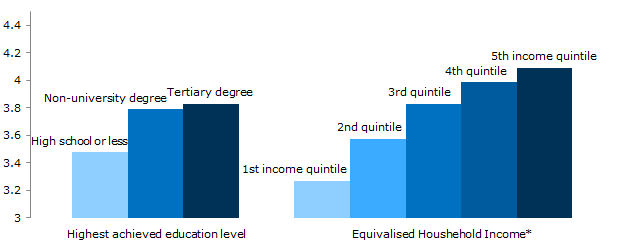 |
|
*Equivalised household income refers to per-capita income adjusted using the OECD square root equivalence scale |
In the Trustlab countries, people with higher education and income levels consistently have more confidence in the people and institutions around them.
WHAT DRIVES TRUST? |
To better understand what exactly drives low levels of trust in government, Trustlab asks people how they expect government institutions or individual political or civil servants to react to certain situations, giving a sense of people’s perceptions of the values and competences of their governments.
There are substantial differences in perceptions of government competence and values between countries, but perceptions of integrity and responsiveness are low across the board
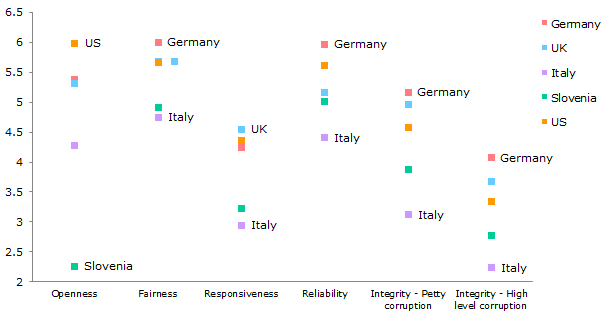 |
|
Questions were asked on a scale from zero to ten. For all dimensions, a higher value signifies a more positive perception. |
Germany – the country with the highest level of trust in government – scores relatively well on both integrity and government competence dimensions, whereas Italy is a consistent poor performer. In all countries, people are highly sceptical of the integrity of their political leaders. Only 17% of people across countries surveyed believe that a parliamentarian would be more likely than not to reject a bribe.
Perceptions of high-level corruption are the strongest determinant of trust, followed by satisfaction with services and government reliability and responsiveness
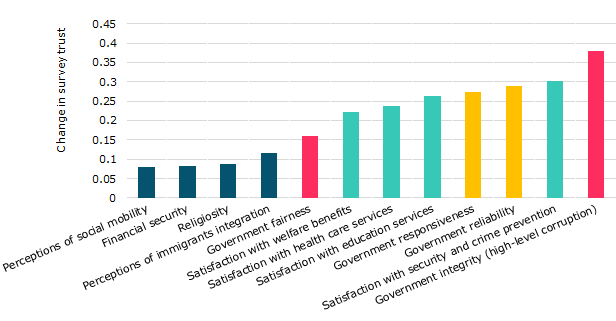 |
|
All determinants presented here were found to be statistically significant determinants of trust in government. For more information see Murtin, F., et al. (2018), "Trust and its determinants: Evidence from the Trustlab experiment", OECD Statistics Working Papers, No. 2018/02. |
Trustlab research finds that high level government integrity is the governmental characteristic most strongly associated with trust in government. Other important determinants of trust in government are satisfaction with a number of government services and the responsiveness and reliability of the government. People who believe immigrants are well integrated in society, too, have higher levels of trust in government.
NEW MEASURES OF TRUST |
One aim of the Trustlab project is to better understand what type of real-world behaviour is captured by survey questions. Comparing people’s responses to survey questions with their behaviour in experimental games helps shed light on the nature of trust and why people answer the way they do.
Experimental measures of altruism and expected trustworthiness go hand in hand with survey trust
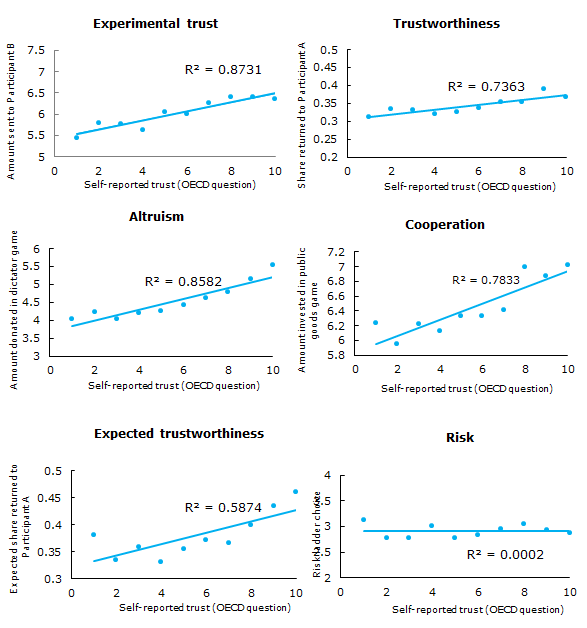 |
|
These figures show the average score of the various social norms for each level of self-reported trust. For more information on the measurement of the social norms, see Murtin, F., et al. (2018), "Trust and its determinants: Evidence from the Trustlab experiment", OECD Statistics Working Papers, No. 2018/02. |
In the virtual Trustlab platform, participants take part in behavioural games where they earn actual money as a way of identifying the social norms that influence how people interact with one another in the real world. Trustlab data shows that altruism and expected trustworthiness (how trustworthy respondents think others will be) are the strongest predictors of the survey measure of trust.
The second major methodological innovation that is tested in Trustlab concerns the measurement of trust in government. There is reason to believe that people’s self-reported attitudes to government are biased by social or cognitive distortions that favour negative perceptions over positive ones.
One way to overcome biases in survey answers is by using an Implicit Association Test (IAT), which relies on the timed sorting of words related to government and trust, in order to determine whether positive associations between the two concepts are made more easily than negative associations.
Forthcoming research based on the Trustlab data considers the different determinants of IAT and self-reported trust in more detail.
NEXT STEPS |
Further research using the Trustlab data is forthcoming, from the OECD and our network of academic partners.
The Network also hopes to expand the dataset with new countries. Interested potential partners in other countries are welcome to contact the Trustlab Network at wellbeing@oecd.org with any comments or questions about potential collaborations.
THE NETWORK |

Documents connexes